“From the very core of our being, we simply desire joy and contentment,” the Dalai Lama states in The Book of Joy: Lasting Happiness in a Changing World (2016), author Douglas Abrams’ narrated account of a week spent interviewing the Dalai Lama and Archbishop Desmond Tutu.
“It does not matter whether one is a Buddhist like me, or a Christian like the Archbishop, or any other religion, or no religion at all. From the moment of birth, every human being wants to discover happiness and avoid suffering.”
We are, indeed, a happiness seeking people, united in our shared striving toward something that can at times seem frustratingly unattainable, elusive even – “like a butterfly that lands on us and then flutters away,” says the Dalai Lama.
But, is happiness really elusive? Or, could it be that we’re just looking in the wrong place?
“Everyone seeks happiness, joyfulness, but from outside – from money, from power, from big car, from big house,” says the Dalai Lama. “Most people never pay much attention to the ultimate source of a happy life, which is inside, not outside.”
Illuminating a truth that has become increasingly important to grasp in an era that promises fulfillment in nearly everything outside of ourselves, the Dalai Lama and Archbishop offer eight pillars of joy – inner values, or “qualities of the mind” and “qualities of the heart” – that provide a roadmap for navigating life’s inevitable suffering, and unlocking the lasting happiness we so often long for.
Here we’ll focus here on the first four, explained by the Dalai Lama and Archbishop as “qualities of the mind“: Perspective, Humility, Humor, and Acceptance.
1. Perspective
“A healthy perspective really is the foundation of joy and happiness, because the way we see the world is the way we experience the world. Changing the way we see the world in turn changes the way we feel and the way we act, which changes the world itself.” –Author Douglas Abrams
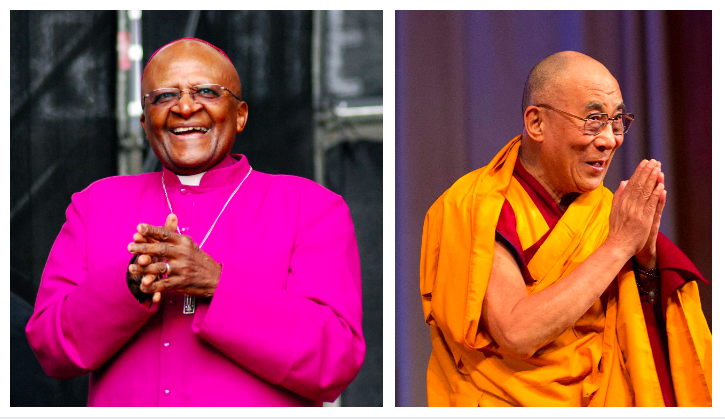
Simply put, we have more control than we think:
“Sadly, many of the things that undermine our joy and happiness we create ourselves. Often it comes from the negative tendencies of the mind, emotional reactivity, or from our inability to appreciate and utilize the resources that exist within us. The suffering from a natural disaster we cannot control, but the suffering from our daily disasters we can. We create most of our suffering, so it should be logical that we also have the ability to create more joy. It simply depends on the attitudes, the perspectives, and the reactions we bring to situations and to our relationships with other people.” –Dalai Lama
Widening our perspective and adopting the perspective of others is particularly helpful:
“The Dalai Lama used the terms wider perspective and larger perspective. They involve stepping back, within our own mind, to look at the bigger picture and to move beyond our limited self-awareness and limited self-interest. Every situation we confront in life comes from the convergence of many contributing factors.” –Author Douglas Abrams
Using the example of being stuck in traffic, the Archbishop explains:
“I have sometimes said to people, when you are stuck in a traffic jam, you can deal with it in one of two ways. You can let the frustration eat you up. Or you can look around at the other drivers and see that one might have a wife who has pancreatic cancer. It doesn’t matter if you don’t know exactly what they might have, but you know they are all suffering with worries and fears because they are human. And you can lift them up and bless them. You can say, Please, God, give each one of them what they need.”
Taking a “God’s-eye perspective” allows us to “transcend our limited identity and limited self-interest”:
“One does not have to believe in God to experience this mind-altering shift in perspective. The famous Overview Effect is perhaps the most profound example. Many astronauts have reported that once they glimpsed the Earth from space – a small blue ball floating in the vast expanse, lacking our human-made borders – they never looked at their personal or national interests in quite the same way again. They saw the oneness of terrestrial life and the preciousness of our planetary home.” –Archbishop
In other words, it’s all about the long view:
“By stepping back we can also see the long view, and have a clearer understanding of our actions and our problems in the larger frame of our life. This allows us to see that even though our situation may seem challenging now, from the vantage point of a month or a year or a decade these challenges will seem much more manageable…[t]hinking of our world’s problems in this long sweep of planetary history really is the long view. It puts our daily concerns into a much broader perspective.” –Author Douglas Abrams
2. Humility
“There is a Tibetan prayer, which is part of the mind-training teachings. A Tibetan master says, ‘Whenever I see someone, may I never feel superior. From the depth of my heart, may I be able to really appreciate the other person in front of me.’” –Dalai Lama
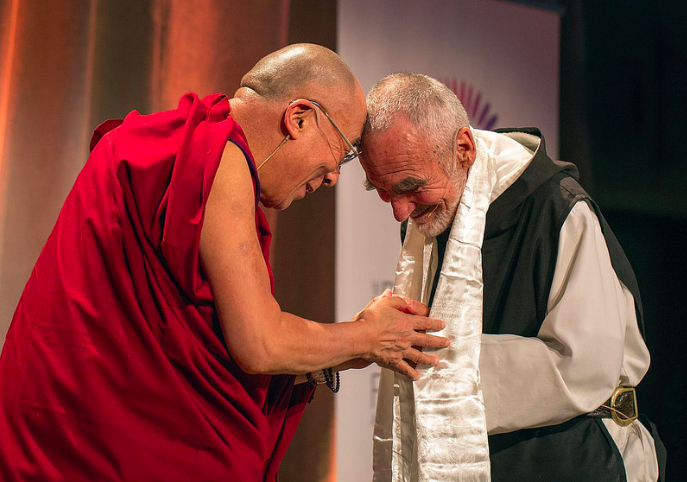
Often times, arrogance comes from a place of insecurity:
“None of us are immune to the all-too-human traits of pride or ego, but true arrogance really comes from insecurity. Needing to feel that we are bigger than others comes from a nagging fear that we are smaller. Whenever the Dalai Lama senses this danger, he looks at a bug or some other creature and reminds himself that, in some ways, this creature is better than we are, because it is innocent and free of malice.” –Author Douglas Abrams
And arrogance can actually create a sense of isolation:
“When I was young and had to give some formal teachings, because I was not thinking that we are all same, I would experience anxiety. I would forget that I’m just talking as a human being to fellow human beings. I would think of myself as something special, and that kind of thinking would make me feel isolated. It is this sense of separateness that isolates us from other people in fact, this kind of arrogant way of thinking creates a sense of loneliness, and then anxiety.” –Dalai Lama
In humility, we recognize our need for others:
“The Dalai Lama and the Archbishop were both insistent that humility is essential to any possibility of joy. When we have a wider perspective, we have a natural understanding of our place in the great sweet of all that was, is, and will be. This naturally leads to humility and the recognition that as human beings we can’t solve everything or control all aspects of life. We need others.” –Author Douglas Abrams
In fact, we come to see that we’re actually not that different from others:
“When we meet anyone, first and foremost we must remember that they, too, have the same desire to have a happy day, a happy month, a happy life. And all have the right to achieve it.” –Dalai Lama
In other words:
“When we realize that we are all children of God, and of equal and intrinsic value, then we don’t have to feel better or worse than others….[n]o one is a divine accident.” –Archbishop
3. Humor
“When we learn to take ourselves slightly less seriously, then it is a very great help. We can see the ridiculous in us.” –Archbishop
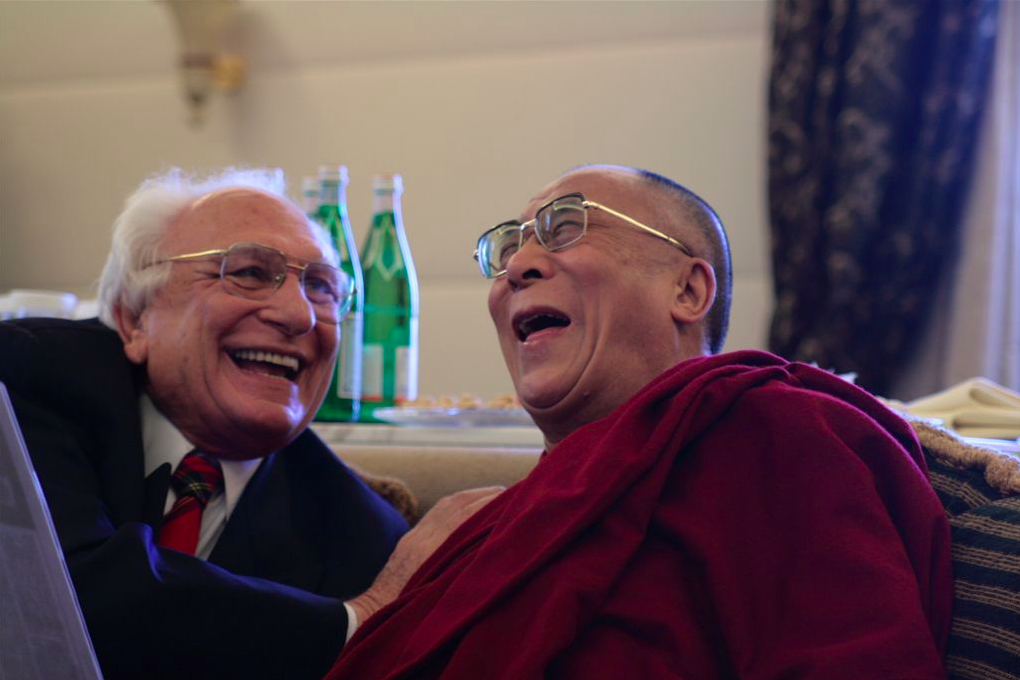
Laughter really is good medicine:
“I think the scientists are right. People who are always laughing have a sense of abandon and ease. They are less likely to have a heart attack than those people who are really serious and who have difficulty connecting with other people.” – Dalai Lama
Humor requires humility:
“Humor, like humility, comes from the same root word for humanity: humus. The lowly and sustaining earth is the source for all three words. Is it any surprise that we have to have a sense of humility to be able to laugh at ourselves and that to laugh at ourselves reminds us of our shared humanity?” –Author Douglas Abrams
And actually helps bring us together:
“If you can manage to downgrade yourself, if you are able to laugh at yourself and get others to laugh at you without feeling guilty that they are laughing at you. The humor that doesn’t demean is an invitation to everyone to join in the laughter. Even if they’re laughing at you they’re joining you in a laughter that feels wholesome.
Because, at the end of the day, we’re all just humans:
“…this kind of humor says, ‘Come stand next to me and let’s laugh at me together, then we can laugh at you together.’ It does not belittle either of us but uplifts us, allows us to recognize and laugh about our shared humanity, about our shared vulnerabilities, our shared frailties. Life is hard, you know, and laughter is how we come to terms with all the ironies and cruelties and uncertainties that we face.” –Archbishop
In other words:
“Laugh at yourself and don’t be so pompous and serious. If you start looking for the humor in life, you will find it you will stop asking, Why me? And start recognizing that life happens to all of us. It makes everything easier, including your ability to accept others and accept all that life will bring.” –Archbishop
4. Acceptance
“Why be unhappy about something if it can be remedied? And what is the use of being unhappy if it cannot be remedied?” –Dalai Lama
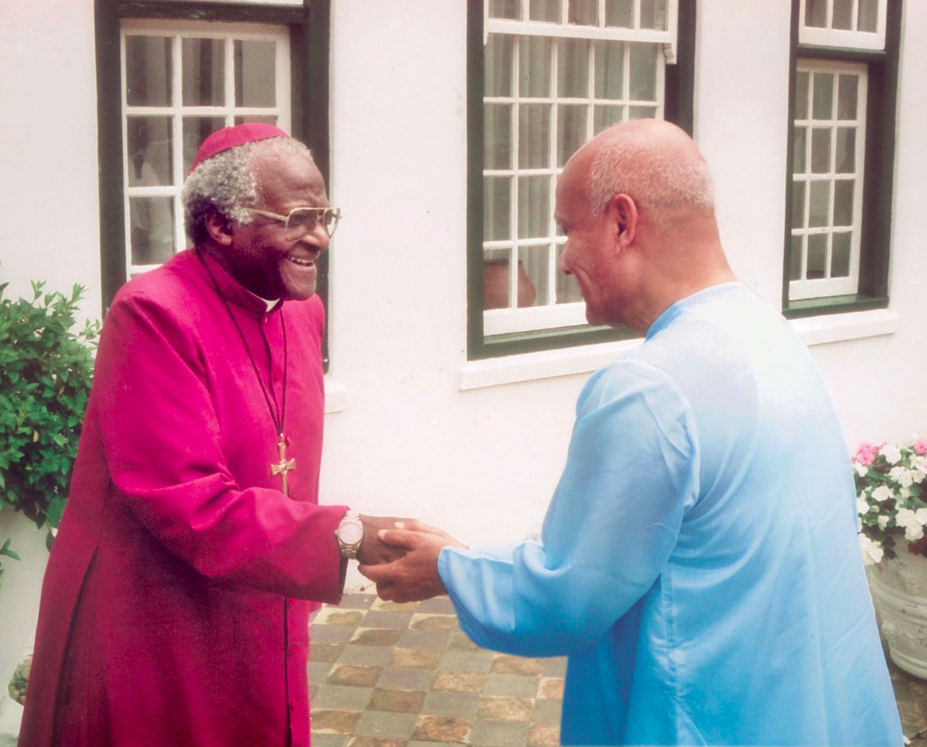
Acceptance of all that we face in our lives is a key ingredient to joy:
“Acceptance – whether we believe in God or not – allows us to move into the fullness of joy. It allows us to engage with life on its own terms rather than rail against the fact that life is not as we would wish. It allows us not to struggle against the day-to-day current.” –Author Douglas Abrams
But acceptance isn’t the same as resignation or defeat:
“We are meant to live in joy. This does not mean that life will be easy or painless. It means that we can turn our faces to the wind and accept that this is the storm we must passthrough. We cannot succeed by denying what exists. The acceptance of reality is the only place from which change can begin.” –Archbishop
It’s all about readjusting our expectations:
“So many of the causes of suffering come from our reacting to the people, places, things, and circumstances in our lives, rather than accepting them. When we react, we stay locked in judgment and criticism, anxiety and despair, even denial and addition. It is impossible to experience joy when we are stuck this way. Acceptance is the sword that cuts through all of this resistance, allowing us to relax, to see clearly, and to respond appropriately.” –Author Douglas Abrams
So the question to ask ourselves is:
Not, “How do we escape it?” But “How can we use this as something positive?” –Archbishop
Using the example of a difficult neighbor, the Dalai Lama explains:
“You can judge and criticize them. You can live in anxiety and despair that you will never have a good relationship with them…[or]…you can accept that your relationship with your neighbor is difficult and that you would like to improve it. You may or may not succeed, but all you can do is try. You cannot control your neighbor, but you do have some control over your thoughts and feelings. Instead of anger, instead of hatred, instead of fear, you can cultivate compassion for them, you can cultivate kindness toward then…warmheartedness toward them.”
The Book of Joy is an uplifting and delightful read, full of jokes and laughter between the Dalai Lama and Archbishop, arguably two of the most joyful people on earth. Indeed, for two people who have endured exile and oppression, the joy they embody is a true inspiration, a testimony to the resiliency of the human spirit.
As the Archbishop reminds us, “We are fragile creatures, and it is from this weakness, not despite it, that we discover the possibility of true joy.”
The book explores the nature of true joy and the obstacles to joy – from fear, anger, and stress to grief, illness, and death – before diving into the eight pillars that provide the foundation for lasting happiness.
Similar posts:
- Part II: The Dalai Lama and Archbishop Desmond Tutu on the Four Qualities of the Heart that Lead to Joyful Living
- Saint Augustine on the Happy Life and Finding Joy
- Epictetus on How to Live a Good, Fulfilling Life
- Think Carefully: Marcus Aurelius on How to Control the Mind
- Gisele Bündchen on Self-Awareness, Challenging Your Thoughts and Paying Attention to Your Inner Voice

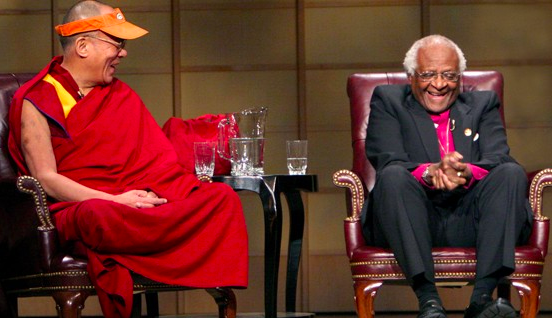
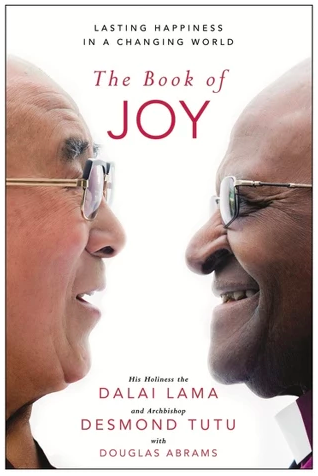
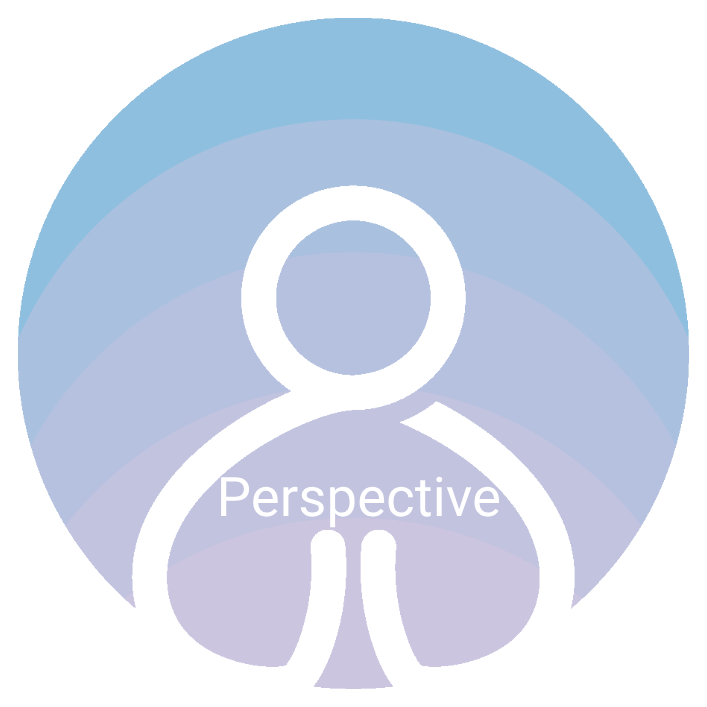



Dear Katharine,
Thank you so much for this article – I really needed this! Need to read it again and again!
Jennifer
You’re so welcome! I’m glad you enjoyed it.